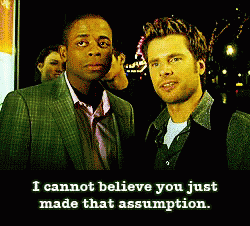If a person is serious about not wanting to get addicted to drugs, they should probably be extremely attentive about the things that they choose to snort. Obviously, that isn't a prerequisite to getting addicted to opiates, but steering clear of that is a step in the right direction (and the subject of the post to which you responded negatively).Do you believe people want to be addicted to opiates?
You obviously know nothing about the topic you are trying to discuss so if I were you I would just move along.
You are using an out of date browser. It may not display this or other websites correctly.
You should upgrade or use an alternative browser.
You should upgrade or use an alternative browser.
Recruiting forum off topic thread (no politics, covid, or hot button issues)
- Thread starter volamite86
- Start date
Nuctech777
Well-Known Member
- Joined
- Dec 17, 2012
- Messages
- 2,406
- Likes
- 7,829
Exactly. You can’t make assumptions about a whole group of people based on the actions or experience of a subset of individuals. It would be like using millennial as an insult and thinking you are clever.LOL saying people who abused it by snorting it are "victims" is also abhorrent and offensive to actual victims. There are victims who should not be blamed, but people who intentionally abuse drugs for recreational purposes are not victims.
You're not usually such a binary poster. This situation has nuance, it's not 100% in either direction. Don't be a stereotypical millennial by trying to make it that way. Some people can be evil and others can be victims and others not be victims all in the same scenario.
Orange_Crush
Resident windbag genius
- Joined
- Dec 1, 2004
- Messages
- 42,855
- Likes
- 88,375
Just because an argument is moderate doesn't mean it's true. Doesn't mean it's not, but moderation isn't the litmus test for truth. Truth is the litmus test for truth.I just like takes that are circumspect and moderate. Everything you all are saying is probably true, but laying blame at the feet of any single party or even on a single side of an issue is rarely accurate.
Per circumspect, truth is often risky these days.
jave36
Well-Known Member
- Joined
- Nov 29, 2011
- Messages
- 26,382
- Likes
- 31,089
99.9999% of the time, especially in super complex situations, the truth is not an extreme or a binary. So, I disagree, when an argument isn't moderate, it's a safe bet it's not true.Just because an argument is moderate doesn't mean it's true. Doesn't mean it's not, but moderation isn't the litmus test for truth. Truth is the litmus test for truth.
Per circumspect, truth is often risky these days.
jave36
Well-Known Member
- Joined
- Nov 29, 2011
- Messages
- 26,382
- Likes
- 31,089
It wasn't an insult. It was comparing and aligning someone's statement with the stereotype of a group that has vastly altered how conversation happens in our culture by being binary and extreme too often. Which is different than using millennial as an insult. If you cared about being accurate and moderate instead of trying to come up with a clever zinger, you'd have caught the nuance. But because you clearly have a propensity for insults over civilized discussion, you projected that on to me.Exactly. You can’t make assumptions about a whole group of people based on the actions or experience of a subset of individuals. It would be like using millennial as an insult and thinking you are clever.
Orange_Crush
Resident windbag genius
- Joined
- Dec 1, 2004
- Messages
- 42,855
- Likes
- 88,375
Nuctech777
Well-Known Member
- Joined
- Dec 17, 2012
- Messages
- 2,406
- Likes
- 7,829
Keep fighting the good fight sir.It wasn't an insult. It was comparing and aligning someone's statement with the stereotype of a group that has vastly altered how conversation happens in our culture by being binary and extreme too often. Which is different than using
millennial as an insult. If you cared about being accurate and moderate instead of trying to come up with a clever zinger, you'd have caught the nuance. But because you clearly have a propensity for insults over civilized discussion, you projected that on to me.

Also, did you just assume my propensities?

Last edited:
Orange_Crush
Resident windbag genius
- Joined
- Dec 1, 2004
- Messages
- 42,855
- Likes
- 88,375
The Jews absolutely, positively didn't deserved the Nazi gas chambers.99.9999% of the time, especially in super complex situations, the truth is not an extreme or a binary. So, I disagree, when an argument isn't moderate, it's a safe bet it's not true.
You'd lose the bet on that one.
What's interesting is that your argument per the trustworthiness of moderate and circumspect arguments is neither moderate, nor circumspect.
Critical thinking would demand a bit more in ascertaining truth that shortcuts like this.
Nuctech777
Well-Known Member
- Joined
- Dec 17, 2012
- Messages
- 2,406
- Likes
- 7,829
The Jews absolutely, positively didn't deserved the Nazi gas chambers.
You'd lose the bet on that one.
What's interesting is that your argument per the trustworthiness of moderate and circumspect arguments is neither moderate, nor circumspect.
Critical thinking would demand a bit more in ascertaining truth that shortcuts like this.

Devo182
"Well Known Member" TWSS
- Joined
- Jan 25, 2015
- Messages
- 40,637
- Likes
- 140,455
jave36
Well-Known Member
- Joined
- Nov 29, 2011
- Messages
- 26,382
- Likes
- 31,089
Your example is an exception that proves the rule. And when you pose a binary question, then the answer must necessarily be binary.The Jews absolutely, positively didn't deserved the Nazi gas chambers.
You'd lose the bet on that one.
What's interesting is that your argument per the trustworthiness of moderate and circumspect arguments is neither moderate, nor circumspect.
Critical thinking would demand a bit more in ascertaining truth that shortcuts like this.
And your counter is basically "you can't say people shouldn't operate in absolutes because that statement is an absolute." If we can't agree to stay off that avenue of overly simplistic, abysmal logic, there's no point in discussing complex ideas.
SSVol
Neeerrrrrddd!
- Joined
- Nov 26, 2012
- Messages
- 8,762
- Likes
- 35,652
The Jews absolutely, positively didn't deserved the Nazi gas chambers.
You'd lose the bet on that one.
What's interesting is that your argument per the trustworthiness of moderate and circumspect arguments is neither moderate, nor circumspect.
Critical thinking would demand a bit more in ascertaining truth that shortcuts like this.
There are no absolutes, which is in itself an absolute. Although I guess he left an out with the 0.0001%...
knoxvol52
Nevermind me, I'm just a Commoner.
- Joined
- Sep 11, 2022
- Messages
- 42,261
- Likes
- 135,675
I apologize to you didn't mean for it to turn into this!!!!!!Joe, I'm not a millenial.
All situations have nuance. My org post was in reply to people who state no wrong doing after countless died.
It was about knowingly, and braggingly providing access to people who are addicted, causing new addictions, and profiting off of that. A death is a death, and therefore were a victim of such.
Some could have lived had they been given access to recovery. Dont be so binary, whatever the hell that means.
Jackcrevol
All Day Long!
- Joined
- Jan 23, 2005
- Messages
- 75,665
- Likes
- 193,892
gainesvol82
Wifey scrunch face
- Joined
- May 7, 2008
- Messages
- 8,724
- Likes
- 15,040
Chris and Jeff George: Where Are the Drug Kingpins Now?
If you were around 18 in 1998. . . from '98 to about 2014 I think, you're lucky to be alive. Wasn't even younger people either. It was every type of person getting hooked, teachers, housewives, lawyers, doctors, nurses, cops etc. Ruined a lot of lives, some are still ruined and a lot are dead.
You'd probably like that show with Michael Keaton. . . Dopesick I think it's called.
Very good show and very realistic. Keaton's character was inspired by a real doctor from East TN who does addiction counseling now.
My FIL had thousands of the Oxycontin 80's in sealed bottles in his gun safe when I first met my now wife. Very tempting for 2 teenagers.
Orange_Crush
Resident windbag genius
- Joined
- Dec 1, 2004
- Messages
- 42,855
- Likes
- 88,375
Exceptions don't prove rules. They undermine them. That's another commonly accepted bit of anti-logic.Your example is an exception that proves the rule. And when you pose a binary question, then the answer must necessarily be binary.
And your counter is basically "you can't say people shouldn't operate in absolutes because that statement is an absolute." If we can't agree to stay off that avenue of overly simplistic, abysmal logic, there's no point in discussing complex ideas.
No. My counter was that your argument breaks its own rule. The funny thing is that your rule is overly simplistic, abysmal logic.
The lesson would be to attack an argument on its own merits, as opposed to relying on some unfounded rule of thumb to discredit it. If @Jackcrevol's argument was untrue, then argue a valid reason why. Like the fact that each supposed "victim" made a choice to snort the drug. He could counter the chemical effects on human brain receptors. You two could have a nuanced discussion on the philosophy of human volition in the argument of drug addictions, and the actions of drug dealers to increase revenue and foster addiction.
Now, that would be a far more interesting and truth-seeking debate than the binary, non-circumspect, non-moderate logical short-cut argument that only moderate and circumspect arguments are to be trusted. You'd probably actually find that @Jackcrevol offered a fairly moderate and nuanced perspective. Quite often, drug addict deaths are culpable for their actions while also being victims of the drug trade.
My nephew died of a heroin overdose. He was culpable for taking the drugs. But the dealers had been lacing the product with (cheaper and much stronger) fentinol to varying degrees to increase profits and worsen addiction, much like the tobacco companies had been doing throughout their histories. My nephew got a batch of heroin with far too much fentinol in it, and it turned him purple and swelled his brain until they turned the life support off.
He was culpable for shooting it. He was also a victim of a horrible and seedy industry that's willing to kill people for profit.
allvolrecruiting
Well-Known Member
- Joined
- May 10, 2021
- Messages
- 7,644
- Likes
- 38,412
volbeast33
You can count on Carlos!
- Joined
- Mar 21, 2009
- Messages
- 35,558
- Likes
- 108,624
Jackcrevol
All Day Long!
- Joined
- Jan 23, 2005
- Messages
- 75,665
- Likes
- 193,892
There is an intent to cause harm, unintentionally, with knowledge - even joking about - said harm.Exceptions don't prove rules. They undermine them. That's another commonly accepted bit of anti-logic.
No. My counter was that your argument breaks its own rule. The funny thing is that your rule is overly simplistic, abysmal logic.
The lesson would be to attack an argument on its own merits, as opposed to relying on some unfounded rule of thumb to discredit it. If @Jackcrevol's argument was untrue, then argue a valid reason why. Like the fact that each supposed "victim" made a choice to snort the drug. He could counter the chemical effects on human brain receptors. You two could have a nuanced discussion on the philosophy of human volition in the argument of drug addictions, and the actions of drug dealers to increase revenue and foster addiction.
Now, that would be a far more interesting and truth-seeking debate than the binary, non-circumspect, non-moderate logical short-cut argument that only moderate and circumspect arguments are to be trusted. You'd probably actually find that @Jackcrevol offered a fairly moderate and nuanced perspective. Quite often, drug addict deaths are culpable for their actions while also being victims of the drug trade.
My nephew died of a heroin overdose. He was culpable for taking the drugs. But the dealers had been lacing the product with (cheaper and much stronger) fentinol to varying degrees to increase profits and worsen addiction, much like the tobacco companies had been doing throughout their histories. My nephew got a batch of heroin with far too much fentinol in it, and it turned him purple and swelled his brain until they turned the life support off.
He was culpable for shooting it. He was also a victim of a horrible and seedy industry that's willing to kill people for profit.
The brothers were spoiled rich boys with zero morality. If they hadnt been so evil, I would have felt sympathetic to their ignorance. But they knew, often joked of others stupdity. One was even a white supremacist. Lived a life of excess predicated on predation on others weaknesses.
Judgement will come.
Jackcrevol
All Day Long!
- Joined
- Jan 23, 2005
- Messages
- 75,665
- Likes
- 193,892
Orange_Crush
Resident windbag genius
- Joined
- Dec 1, 2004
- Messages
- 42,855
- Likes
- 88,375
I'm not familiar with the story, either side of it, so I don't know. If I researched the story, I may even agree with @jave36. I just disagree with how he's defending his position. It's kind of like a kid that answers 5 on a math test, and the question was "What is 25 divided by 5?" Well, he got the right answer, but he doesn't know multiplication. He just counted the number of digits on his right hand and wrote the number down.There is an intent to cause harm, unintentionally, with knowledge - even joking about - said harm.
The brothers were spoiled rich boys with zero morality. If they hadnt been so evil, I would have felt sympathetic to their ignorance. But they knew, often joked of others stupdity. One was even a white supremacist. Lived a life of excess predicated on predation on others weaknesses.
Judgement will come.
I was just pointing out a particularly poor way of assigning truth. I did so because I think it's becoming a more prevalent way of thinking. Instead of teaching people critical thinking these days, people are being taught to prefer the middle ground, "moderate", risk-less answers. Well, let's look for truth where truth can be found, no matter how extreme and risky it may be. No matter how it may offend or not.
Jackcrevol
All Day Long!
- Joined
- Jan 23, 2005
- Messages
- 75,665
- Likes
- 193,892
I think moderation is a great place to live, in a core set of beliefs. Why do I need ti be drug/dragged farther out to sea? There'a plenty of knowledge here in this bay, for my WV.I'm not familiar with the story, either side of it, so I don't know. If I researched the story, I may even agree with @jave36. I just disagree with how he's defending his position. It's kind of like a kid that answers 5 on a math test, and the question was "What is 25 divided by 5?" Well, he got the right answer, but he doesn't know multiplication. He just counted the number of digits on his right hand and wrote the number down.
I was just pointing out a particularly poor way of assigning truth. I did so because I think it's becoming a more prevalent way of thinking. Instead of teaching people critical thinking these days, people are being taught to prefer the middle ground, "moderate", risk-less answers. Well, let's look for truth where truth can be found, no matter how extreme and risky it may be. No matter how it may offend or not.
bigl3327
Well-Known Member
- Joined
- Sep 16, 2009
- Messages
- 6,974
- Likes
- 34,510
SweetasSoda
Captain of the Cheerleaders
- Joined
- Jul 28, 2018
- Messages
- 22,989
- Likes
- 141,171
Devo182
"Well Known Member" TWSS
- Joined
- Jan 25, 2015
- Messages
- 40,637
- Likes
- 140,455
Risky behavior. Or used to be. This place has eased up imo.I'm not familiar with the story, either side of it, so I don't know. If I researched the story, I may even agree with @jave36. I just disagree with how he's defending his position. It's kind of like a kid that answers 5 on a math test, and the question was "What is 25 divided by 5?" Well, he got the right answer, but he doesn't know multiplication. He just counted the number of digits on his right hand and wrote the number down.
I was just pointing out a particularly poor way of assigning truth. I did so because I think it's becoming a more prevalent way of thinking. Instead of teaching people critical thinking these days, people are being taught to prefer the middle ground, "moderate", risk-less answers. Well, let's look for truth where truth can be found, no matter how extreme and risky it may be. No matter how it may offend or not.
I’ve always thought we need a colored font when you’re merely disagreeing with the logic, not necessarily the conclusion itself. Years ago you could say “I love 4-wide sets, all on out routes” and in would come, “Nazi supporter!!”



